Patho diabetes - Study guides, Class notes & Summaries
Looking for the best study guides, study notes and summaries about Patho diabetes? On this page you'll find 864 study documents about Patho diabetes.
Page 2 out of 864 results
Sort by
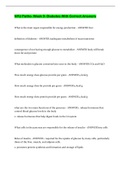
-
NYU Patho- Week 9- Diabetes With Correct Answers
- Exam (elaborations) • 11 pages • 2023
- Available in package deal
-
- $8.99
- 1x sold
- + learn more
NYU Patho- Week 9- Diabetes With Correct Answers...
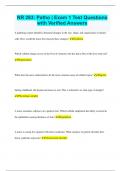
-
NR 283: Patho | Exam 1 Test Questions with Verified Answers
- Exam (elaborations) • 5 pages • 2023
- Available in package deal
-
- $9.99
- 2x sold
- + learn more
NR 283: Patho | Exam 1 Test Questions with Verified Answers A pathology report identifies abnormal changes in the size, shape, and organization of mature cells. How would the nurse best classify these changes? Dysplasia Which cellular change occurs in the liver of someone who has had a lobe of the liver removed? Regeneration What does the nurse understand to be the most common cause of cellular injury? Hypoxia During childhood, the thymus decreases in size. This is referred to as what type o...
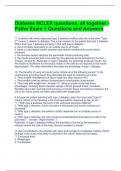
-
Diabetes NCLEX questions, all together - Patho Exam 1 Questions and Answers
- Exam (elaborations) • 47 pages • 2023
- Available in package deal
-
- $12.49
- + learn more
Diabetes NCLEX questions, all together - Patho Exam 1 Questions and Answers
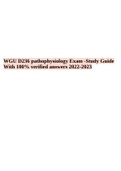
-
WGU D236 pathophysiology OA Exam -Study Guide With 100% verified answers 2022-2023.
- Exam (elaborations) • 28 pages • 2023
- Available in package deal
-
- $10.49
- 2x sold
- + learn more
WGU D236 pathophysiology AO Exam -Study Guide With 100% verified answers 2022-2023. Patho OA Study Guide 1. What is Starling's Law of Capillary forces? How does this explain why a nutritionally deficient child would have edema? Starling’s Law describes how fluids move across the capillary membrane. There are two major opposing forces that act to balance each other, hydrostatic pressure (pushing water out of the capillaries) and osmotic pressure (including oncontic pressure, which pu...
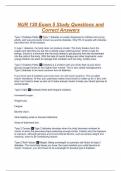
-
NUR 130 Exam 5 Study Questions and Correct Answers
- Exam (elaborations) • 14 pages • 2024
- Available in package deal
-
- $9.49
- + learn more
Type 1 Diabetes Patho Type 1 diabetes is usually diagnosed in children and young adults, and was previously known as juvenile diabetes. Only 5% of people with diabetes have this form of the disease. In type 1 diabetes, the body does not produce insulin. The body breaks down the sugars and starches you eat into a simple sugar called glucose, which it uses for energy. Insulin is a hormone that the body needs to get glucose from the bloodstream into the cells of the body. With the help of insulin ...
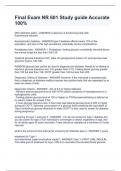
-
Final Exam NR 601 Study guide Accurate 100%
- Exam (elaborations) • 13 pages • 2024
- Available in package deal
-
- $12.99
- + learn more
DM1 definition patho - ANSWER or absence of functioning beta cells Autoimmune disorder Asymptomatic diabetes - ANSWER type II diabetes affects nearly 10% of the population, and due to this high prevalence, potentially severe complications Prediabetes labs - ANSWER 1. Prediabetic- fasting glucose consistently elevated above the normal range but less than 100-125. Impaired glucose tolerance (IGT) state of hyperglycemia where 2 hr post glucose load glycemic level is 140-199. RANDOM gl...
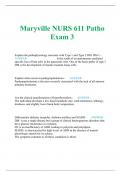
-
Maryville NURS 611 Patho Exam 3 Explain the pathophysiology associate with Type 1 and Type 2 DM. DM 1 - ANSWER - Is the result of an autoimmune mediated specific loss of beta cells in the pancreatic islet. On
- Exam (elaborations) • 12 pages • 2024
- Available in package deal
-
- $11.49
- + learn more
Maryville NURS 611 Patho Exam 3 Explain the pathophysiology associate with Type 1 and Type 2 DM. DM 1 - ANSWER - Is the result of an autoimmune mediated specific loss of beta cells in the pancreatic islet. One of the basic patho of type 2 DM is the development of insulin resistant tissue cells. Explain what occurs in panhypopituitarism - ANSWER - Panhypopituitarism is the term correctly associat...
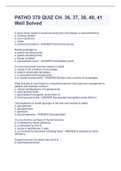
-
PATHO 370 QUIZ CH. 36, 37, 38, 40, 41 Well Solved
- Exam (elaborations) • 12 pages • 2023
- Available in package deal
-
- $9.99
- 1x sold
- + learn more
PATHO 370 QUIZ CH. 36, 37, 38, 40, 41 Well SolvedA tumor which results in excessive production and release of catecholamine is: a. Cushing disease b. Conn syndrome c. Goiter d. pheochromocytoma - ANSWER Pheochromocytoma Barrett esophagus is a. gastrin-secreting lesion b. gastrin-secreting tumor c. benign condition d. preneoplastic lesion - ANSWER Preneoplastic lesion It is true that growth hormone excess in adults a. results in the condition of acromegaly b. leads to abnormally t...
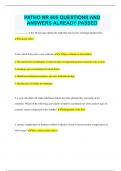
-
PATHO NR 605 QUESTIONS AND ANSWERS ALREADY PASSED
- Exam (elaborations) • 28 pages • 2024
-
- $9.99
- + learn more
PATHO NR 605 QUESTIONS AND ANSWERS ALREADY PASSED ___________ is low blood sugar during the night that may lead to morning hypoglycemia Somoygi effect 5 facts about Polycystic ovary syndrome 1. Oligo-ovulation or anovulation 2. Elevated levels of androgens or clinical signs of hyperandrogenism and polycystic ovaries 3. Leading cause of infertility in United States 4. Multifactorial-Hyperinsulinism- prevents follicular decline 5. Dysfunction of follicle development A 3-year-old child wit...
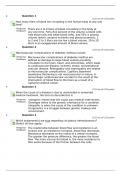
-
WCU PATHO 370: Pathophysiology 370 Final Exam - Questions and Answers Elaborations
- Exam (elaborations) • 20 pages • 2023
-
- $10.99
- + learn more
West Coast University PATHO 370: Pathophysiology 370 Final Exam - Questions and Answers Elaborations Question 1 0.25 out of 0.25 points How many liters of blood are circulating in the human body at any one time? Response Feedback: There are 4 to 6 liters of blood circulating in the body at any one time. Forty-five percent of the volume is blood cells (red blood cells and white blood cells), and 55% is plasma volume (which contains nutrients and plasma proteins). 1 to 2 and 2 to 3 li...

Did you know that on average a seller on Stuvia earns $82 per month selling study resources? Hmm, hint, hint. Discover all about earning on Stuvia


